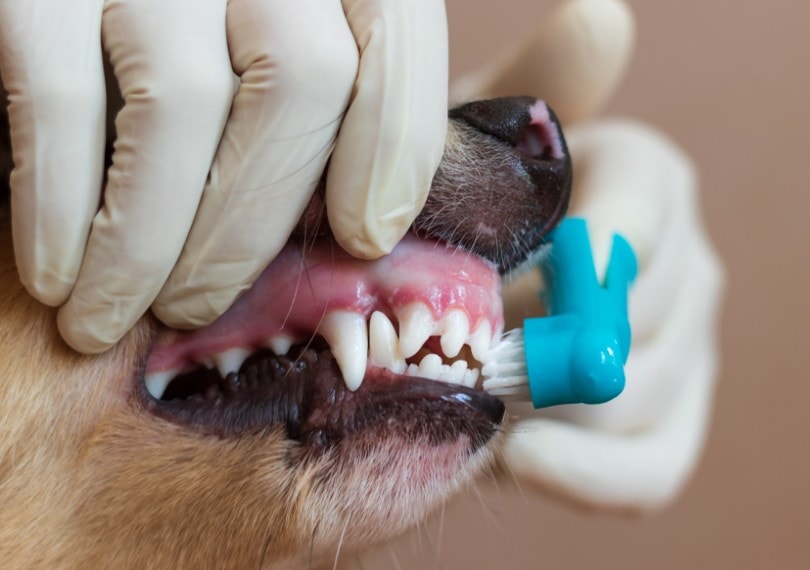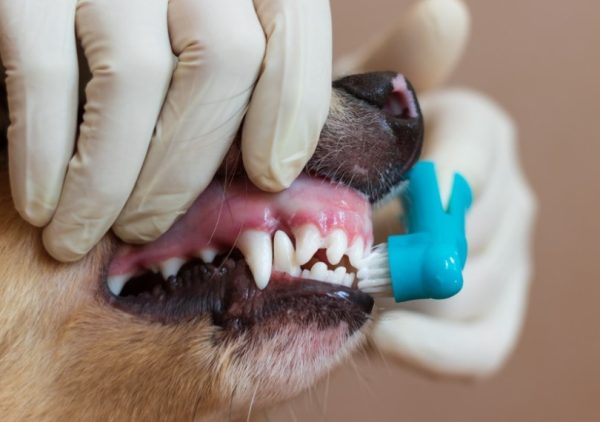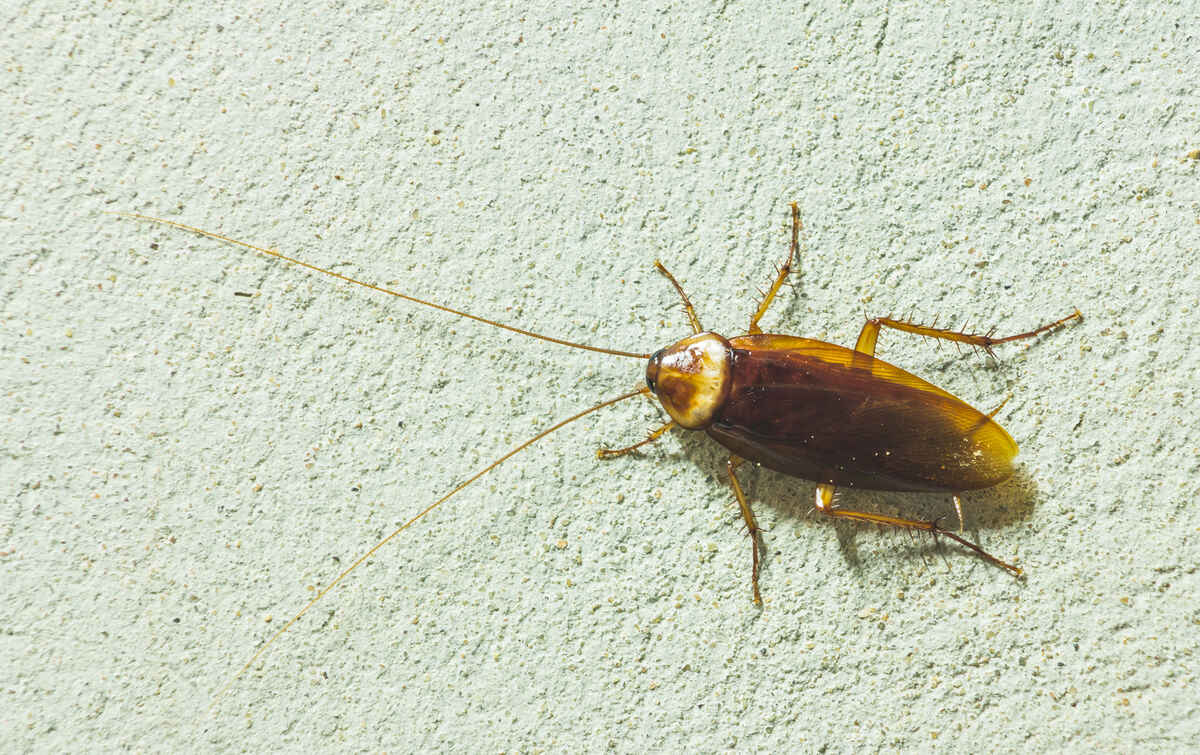If you want your dog’s gum and teeth to stay healthy, you should consider getting their teeth cleaned professionally. Just like people, dogs can have tartar buildup, which can lead to tooth decay. Brushing your dog’s teeth regularly will improve their dental health as long as they undergo professional teeth cleanings occasionally too.
Professional teeth cleaning is done by a vet. Your dog will have to undergo anesthesia for their own safety and comfort, and it allows the vet to examine their teeth thoroughly. Unfortunately, the equipment and treatment used adds up and can cost quite a bit of money, especially if your dog requires more dental work than just cleaning. We’ve got all the costs below so that you can budget correctly without any guesswork.
The Importance of Canine Teeth Cleaning
A scary reality is that gum disease, otherwise known as periodontal disease, is a dental problem that around 90% of dogs will experience in their lifetime, usually showing signs from the age of 2.
This disease causes havoc to your dog’s mouth but often isn’t picked up on in the early stages because the bacteria damage the supporting structures below your dog’s gums first. Unfortunately, the disease can only be reversed in its earliest stage before serious damage has occurred.
If you don’t brush your dog’s teeth, the plaque on them will turn to tartar. Tartar is easy to attach to, which causes more plaque to build. A thick buildup of plaque causes inflammation to occur in the gums, which is how periodontal disease begins. Over time, more and more damage will develop if nothing is done to prevent it.
Tooth decay sounds bad and painful enough, but if those suffering gums aren’t treated, the situation can get much worse and potentially become fatal. Untreated gum disease can lead to jaw fractures, oronasal fistulas, tooth abscesses, oral cancers, eye issues, and risk of organ damage.
Professional teeth cleaning is vital from stage 2 of periodontal disease in dogs. However, preventative teeth cleanings, as well as daily teeth brushing, is the best route to take to prevent periodontal disease from ever occurring.
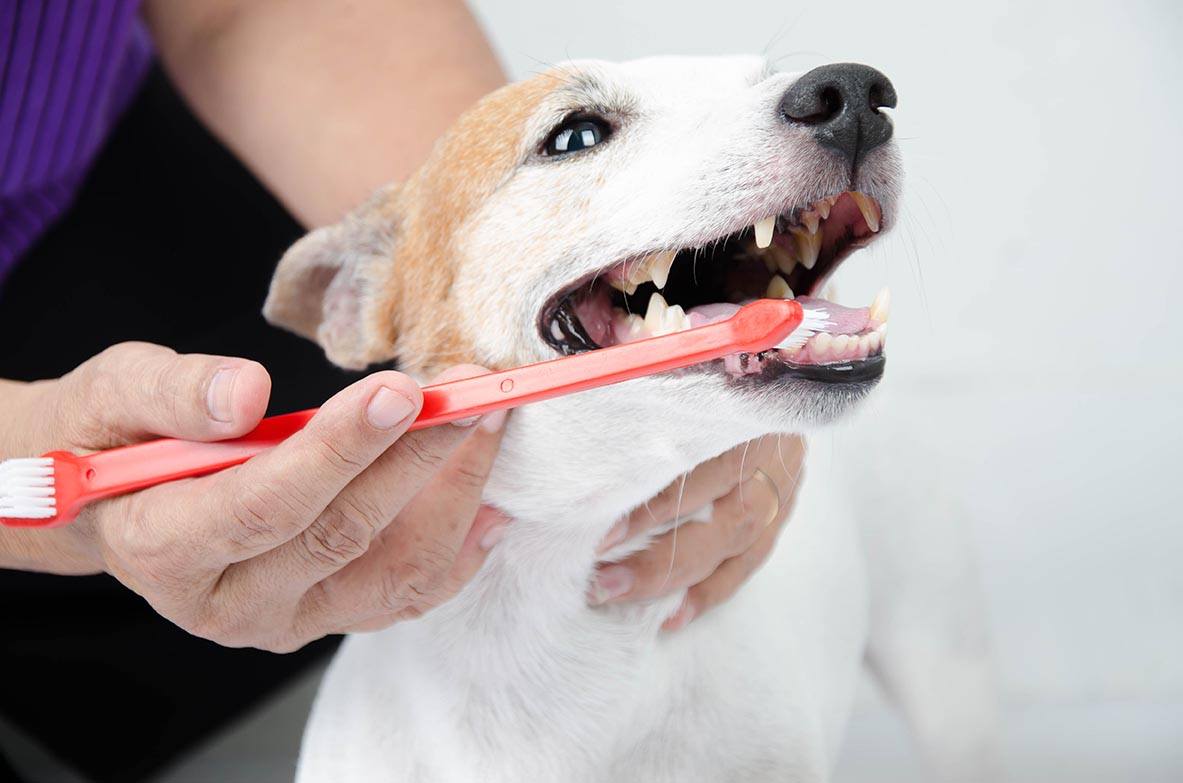
Gum Disease Signs to Look Out For
If you have only recently learned about periodontal disease and haven’t been very strict with brushing your dog’s teeth, you should consider booking them in to get their teeth cleaned professionally. Even though you might not be able to see the signs, gum disease can start from a young age, and your dog might be suffering quietly.
If you’ve noticed that your dog has bad breath, bleeding gums, discolored teeth, is eating slower than usual, isn’t eating, or is struggling to eat, you should take them to your vet for a dental health checkup. Your vet may advise that your dog’s teeth be cleaned, or they may recommend a tooth extraction.
How Much Does Dog Teeth Cleaning Cost?
There are several factors that cause the cost of professional dog teeth cleanings to vary. One of them is the location of the vet practice in the UK. Prices differ greatly from one area in the UK to another. Depending on your location, the cost of cleaning can be between £100 and £500. However, the average cost is £233.
Other factors are the size and weight of your dog. The bigger your dog, the higher your cost will be because they’ll require more anesthesia to keep them asleep during the cleaning.
The age of your dog may also affect the cost, as older dogs will have to have blood work taken to determine the health of their kidneys and livers to make sure they’re healthy enough to undergo anesthesia.
Of course, if your dog has periodontal disease, the vet may have to do more extensive work, which will take longer and cost more. If your vet needs an X-ray of your dog’s teeth or needs to extract a tooth, the cost will go up.
Additional Costs to Anticipate
Sometimes your dog’s dental health may be worse than you expected, and they may require additional treatment during their teeth cleaning procedure.
As we mentioned earlier, if you have a senior dog, your vet probably won’t want to take any risks and will order blood tests to determine whether your dog is healthy enough to undergo general anesthesia to have their teeth professionally cleaned. Blood tests will be an additional cost that you may have to factor in.
To have a clearer understanding, the vet may do x-rays to see underneath your dog’s gums to be able to assess them properly and determine the level of treatment they require. Some vets include the x-rays in their price, and others don’t. Ask your vet for a quote and a breakdown of all the costs ahead of time so that you can budget accordingly.
Advanced gum disease often leads to teeth extractions. Each tooth that needs to be extracted will result in an additional cost because it takes extra time to remove it. If your dog’s tooth requires a root canal, that’ll be an additional cost too. What would usually take around 45 minutes for a professional teeth cleaning procedure can end up being much longer when extractions and root canals are required.
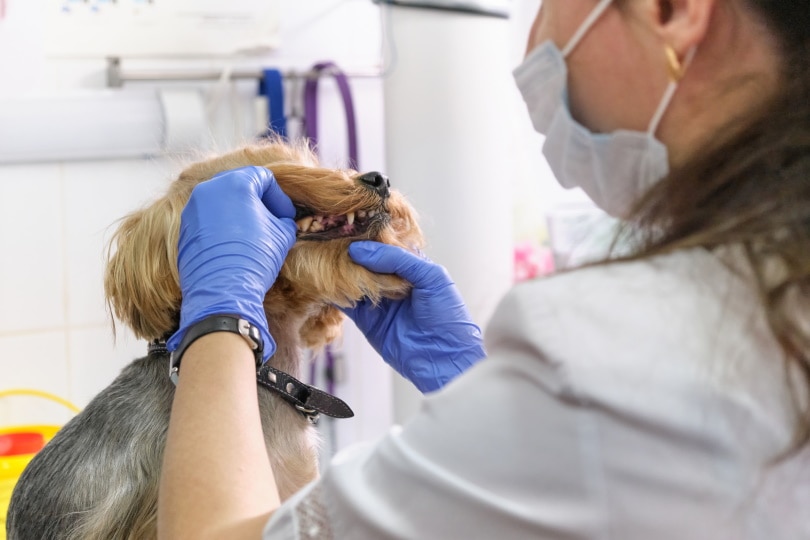
How Frequently Should I Get My Dog’s Teeth Cleaned?
Your dog’s breed, if they have periodontal disease, how advanced it is, and how strict you are with brushing your dog’s teeth will determine how frequently you need to take them to have their teeth cleaned professionally by a vet.
Small dog breeds often have twisted, overlapping, or displaced teeth because there isn’t enough space for all their teeth on their small jaws. The tighter teeth are next to each other, the greater the plaque buildup will be, which is why smaller breeds commonly experience periodontal disease and require more frequent teeth cleanings than larger breeds.
While large breeds can get away with only having their teeth cleaned professionally once a year, smaller breeds should get it done every 6 months. However, your vet will be able to advise you on how frequently your dog should have their teeth cleaned as they will be aware of the state of your dog’s dental hygiene.
You’ll need to get their teeth cleaned more frequently if you aren’t able to brush your dog’s teeth often. Their age and diet are also factors that need to be considered.
If your dog’s gums are bleeding or if they’re struggling to eat, you should take them in to be seen by the vet earlier than their next scheduled appointment.
Does Pet Insurance Cover Dog Teeth Cleaning?
Unless your dog has periodontal disease, your pet insurance isn’t likely to pay for teeth cleanings as it falls under preventative care. The only time it may be covered is if it is required as a form of treatment. If you would like pet insurance to cover your dog’s routine teeth cleanings, you could consider adding a wellness plan to your policy. However, this will be an added expense.
What to Do for Your Dog’s Teeth In Between Cleanings
To maintain your dog’s dental health, don’t only rely on their frequent professional teeth cleanings. There are ways to keep their gums and teeth healthy in between cleanings so that they won’t need tooth extractions and additional treatment.
Firstly, it is essential to brush your dog’s teeth every day. Unfortunately, older dogs may not cooperate well and become stressed if you begin brushing their teeth because they’re unfamiliar with the task. Start brushing your puppy’s teeth from 6 months of age so that they can become accustomed to it. Make sure to use toothpaste that is pet safe, as human toothpaste has ingredients that are toxic to dogs.
If your dog doesn’t let you brush their teeth, you could consider using pet tooth wipes, mouth sprays, and water additives instead. Although these alternatives may not be as effective as brushing your dog’s teeth, they’re more effective than doing nothing.
In addition to brushing your dog’s teeth, you can also get them dental toys that help remove plaque when they chew them. You could also consider changing their diet and transitioning them onto specialized dog food that is designed to improve their dental health. You could also swap out some of their normal treats for dental chews so that they can enjoy a treat while benefitting from its cleaning effects.
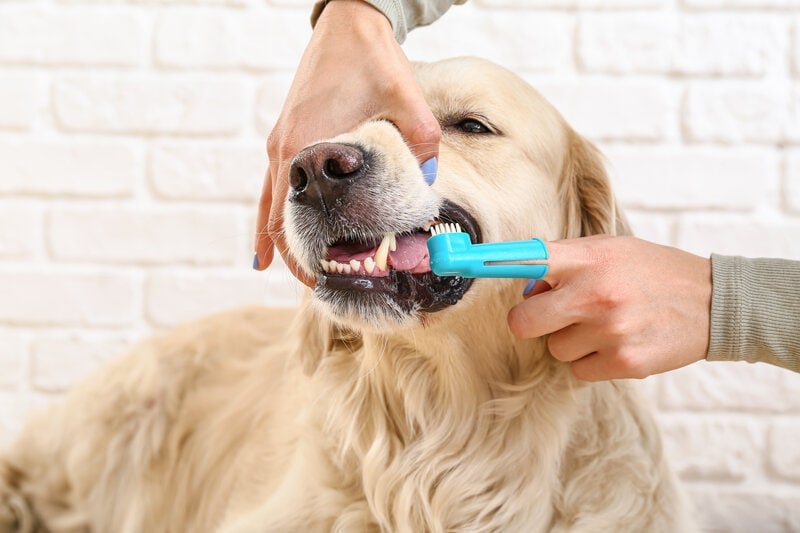
Final Thoughts
Gum disease is common amongst dogs. It’s necessary for you to brush your dog’s teeth every day and take them for routine teeth cleanings to prevent the disease from developing in their gums. Dog teeth cleanings can be expensive because vets must use anesthesia to examine and work on your dog’s teeth, and additional costs will arise if your dog requires tooth extractions or root canals. Your dog’s breed, weight, age, and dental condition determine the cost of the treatment, as well as the location of the vet practice.
Featured Image Credit: DWhiteeye, Shutterstock
Contents
- The Importance of Canine Teeth Cleaning
- Gum Disease Signs to Look Out For
- How Much Does Dog Teeth Cleaning Cost?
- Additional Costs to Anticipate
- How Frequently Should I Get My Dog’s Teeth Cleaned?
- Does Pet Insurance Cover Dog Teeth Cleaning?
- What to Do for Your Dog’s Teeth In Between Cleanings
- Final Thoughts

